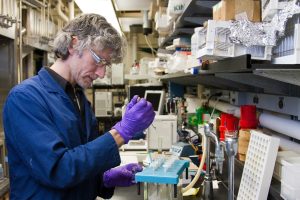EU’s Biotech Act: Accelerating Lab-Grown Food to Market
The future of food is rapidly changing as technology advances and the demand for sustainable and ethical options increases. One emerging solution to this demand is lab-grown food, also known as cultured meat. However, the road to market for these products has been met with numerous challenges and regulatory barriers. The European Union (EU) is taking a proactive approach to this issue with the recent introduction of the EU Biotech Act. This legislation aims to accelerate the approval process for lab-grown food and provide a clear framework for its market introduction. In this article, we will explore the details of the EU’s Biotech Act and how it is paving the way for the future of food in Europe.
The Need for the EU Biotech Act
The concept of lab-grown food has been met with both excitement and skepticism. Proponents tout its potential to reduce the environmental impact of traditional animal agriculture, while opponents raise concerns about the safety and ethics of producing food in a lab. Despite the divide in opinions, there is a growing demand for alternative protein options, making lab-grown food a promising solution.
In order to bring these products to market, companies must navigate a complex regulatory landscape. In the EU, any novel food or food ingredient must undergo a safety assessment and receive approval before it can be placed on the market. This process can take years and is often met with resistance from authorities. Without a clear framework for lab-grown food, companies have faced numerous challenges in gaining approval and bringing their products to consumers.
Accelerating Lab-Grown Food Approval
The EU Biotech Act, officially known as the regulation on novel foods, aims to streamline the approval process for lab-grown food. Under this legislation, food produced using new production methods, such as cell culture, will be subject to a safety assessment but will benefit from a simplified authorization procedure. This means that companies will not have to go through the lengthy and expensive process of obtaining a novel food authorization for each individual product.
In addition to simplifying the approval process, the EU Biotech Act also sets specific timelines for authorization. The European Food Safety Authority (EFSA), responsible for evaluating the safety of novel foods, will have nine months to issue their opinion on a lab-grown food product. This will provide companies with a clear timeline and eliminate the uncertainty and delays they have faced in the past.
Clear Lab-Grown Food Labeling Requirements
Aside from the approval process, another concern surrounding lab-grown food is the labeling of these products. The EU Biotech Act addresses this by requiring clear labeling of lab-grown food products. This means that consumers will be able to easily identify and make informed choices about the food they are purchasing.
The use of terms such as “meat” and “dairy” will also be regulated under the EU Biotech Act. Only products derived from animals will be allowed to use terms such as “milk” or “cheese” on their packaging. This will prevent confusion and ensure that consumers are not misled about the origin of their food.
The Impact of the EU Biotech Act
The introduction of the EU Biotech Act has significant implications for the future of lab-grown food not just in Europe, but globally. By providing a clear framework for approval and labeling, this legislation will open doors for companies looking to bring their products to market in the EU. It also sends a strong message about the EU’s commitment to innovation in the food industry and addressing the challenges of a changing world.
Furthermore, the EU Biotech Act has the potential to pave the way for harmonized regulations on lab-grown food at a global level. As other countries and regions observe the success of this legislation, they may seek to adopt similar measures, creating a more streamlined and consistent regulatory landscape for lab-grown food.
Conclusion
The EU Biotech Act is a major step forward in the regulation of lab-grown food and represents a significant milestone in the journey towards a more sustainable and ethical food system. By accelerating the approval process, providing clear labeling requirements, and setting an example for other regions, the EU is paving the way for the widespread adoption of lab-grown food and its potential to revolutionize the food industry.











